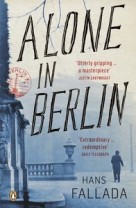It’s spring in Berlin but the cement “coffins” at the Holocaust memorial still cast chilling shadows.
In the Berliner Dom crypt, the sarcophagi are larger and more opulent but the gloom and mustiness mean I can’t avoid reality: these silent tombs speak loudly of doom and death.
Otto Quangel, a key character in Alone in Berlin, works in a factory in Nazi Germany during World War II that shifts from making furniture to building coffins.
The coffins are made from cheap pasteboard and covered in black or brown paint. They’re produced in the tens of thousands and Otto wonders whose bodies they’ll accommodate. He imagines the coffins filling freight trains and entire stations; being for victims of bombing raids or for people in concentration camps; or for dead soldiers who’d fought at the Front.
Otto is married to Anna and despite the couple’s quiet, hardworking ways, the loss of their soldier son to the war galvanises them into action.
They start writing and distributing postcards with anti-Nazi messages. They risk their lives depositing the postcards in public buildings where they hope they will be a beacon — helping people to stand against the evils the state is perpetrating in their midst.
At first, Otto and Anna are successful in their small — and life-threatening — acts of resistance.
A few years into their venture, however, they are finally arrested by the Gestapo and treated as traitors. As they eke out their days in prison on paltry rations and (for some of the time) in solitary confinement they struggle with how to evaluate and live with what (and what little) they’ve done.
At one point, Otto has a cellmate called Dr Reichhardt, who assures him that, even though his resistance has not produced a concrete result, “it will have helped us to feel that we behaved decently till the end.
“Nothing in this world is done in vain,” Dr Reichhardt says, “and since we are fighting for justice against brutality, we are bound to prevail in the end.
“Would you rather live for an unjust cause than die for a just one? There is no choice — not for you, nor for me either. It’s because we are as we are that we have to go this way.”
Geoff Wilkes from the University of Queensland in the book’s Afterword says, “The fact that they [the dissidents] achieve very little material success against the Nazi regime is seen as secondary to the idea that they defeat the regime in ideal and even metaphysical terms, by preserving their moral integrity, both as individuals and as representatives of a better Germany who justify the nation’s survival.”
The antics of a host of colourful characters (many of whom end up being dealt with harshly by the state) also reveal how people struggle with, or are destroyed by, what is happening around them.
“It’s a gnat against an elephant,” says Inspector Escherich to underscore how ludicrous is was for Otto to think he could take on the Fuhrer who, after all, had conquered half the world and was backed by the Party, the Wehrmacht, the SS and the SA.
Otto replies curtly that, “if the one man sees he has no option but to fight, then he will fight, whether he has others on his side or not.
“I had to fight, and given the chance I would do it again. Only I would do it very differently.”
Hans Fallada wrote this remarkable novel, based loosely on the true story of a German couple called Elise and Oto Hempel, in just 24 days. Sadly, he did not live to see it published.
The novel is not without humour but broaches a host of hard-hitting issues head on.
For example:
- When the bartender doesn’t snitch to Inspector Escherich (despite promising the inspector he will do so) it is made clear that, “on the one hand you were afraid of the Gestapo and lived in constant fear of them, it was something else to do their dirty work for them.” Later, however, the bartender would get to know what it meant to be thought of as “unreliable” by the Gestapo.
- A character called Grigoleit says to another called Hergesell that if he wouldn’t stand up against the crimes committed by the Nazis he was worse than the Nazis because “in an extended sense, in a broader sense, your apathy made it possible.”
- Though Otto Quangel had once believed in God and man loving his enemies, “No one could believe in God anymore; it was impossible to credit that a benevolent God would tolerate such widespread wickedness on earth, and as far as men were concerned, those swine …”
- Judge Fromm says, “Half the population is set on locking up the other half. Well, it can’t go on like this much longer.” This small comment reveals the craziness of a regime that declared war on its own citizens as well as on the world. The Nazi threat of arrest, imprisonment, torture and death meant fear and suspicion were the order of the day among German citizens. Being ostracised or unable to find work were lesser, but no less real, threats.
If I’m painting a bleak picture of this fascinating novel, I blame it on being in Berlin and seeing the effects of war up close with its bullet holes, gravestones and coffins.
But don’t be put off.
Author Primo Levi said Alone in Berlin is “the greatest book ever written about German resistance to the Nazis”. And three months after its 2009 English release Alone in Berlin became a “surprise bestseller” in both the US and the UK.
These facts alone should convince you that, despite its difficult subject matter, and its pincer-like picking at mortality and morality, this is an engaging book and one you should read.




Recent Comments